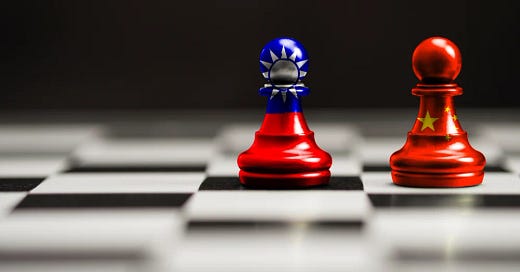CHINA IS WATCHING. The world’s focus is on Russia and Ukraine but not more than Chinese President Xi Jinping. Chinese military commanders are intently studying military tactics used in Ukraine. One Western official involved with policy planning toward China said most likely Beijing was looking at how the Ukraine situation in terms of sanctions on Russia were playing out.
"It's probably seen as a laboratory by China, on what they might face in a Taiwan contingency," the official said, referring to how Western countries may react to a Chinese attack on the island.
Chinese President Xi Jinping, though, is intently watching the US and Western responses in Ukraine. Any hint of hesitation or weakness would give China an opportunity to effect the forcible reunification of Taiwan with the mainland. Washington’s preoccupation with the developments in Europe would give China the time needed for reunification.
Michael McCaul, the top Republican on the House of Representatives’ Foreign Affairs Committee, warned that failure to dissuade Russian President Vladimir Putin would spur China and weaken US credibility.
The West needs to project its power and show that a liberal democracy is still a desired political option for states. A failure to do so in Ukraine would be viewed as a loss and would bolster Chinese and Russian attempts to undermine US credibility as an ally.
Ukraine is not a member of NATO, but has been given guarantees of support from the European Union, NATO, and the US. Yet, Brussels and Washington state clearly they wont send troops on Ukrainian territory. This scenario could develop in Taiwan should Beijing decide to launch a military attack on the island.
Taiwan relies for its safety on the Taiwan Relations Act (TRA) enacted by the US Congress in 1979. It states the US will make available to Taiwan “such defense articles and defense services in such quantity” as needed to “enable Taiwan to maintain a sufficient self-defense capabilities,” while not openly guaranteeing Washington would intrude in the case of a Chinese aggression.
BONUS: Free 21 page document on Taiwan and China: A Geo-Strategic Reassessment of U.S. Policy PDF
Much has been written about the current US policies of Strategic Ambiguity and the recognition of One China.11 Nonetheless, the question arises: Does the US have a contemporary stake in the Taiwan/China issue? If so, what policy should be advocated?
Strategic ambiguity and the one China policy state that the United States recognizes One- China (the PRC) and that resolution of the Taiwan issue should be achieved by peaceful means.
Taiwanese public opinion on how Washington reacted to the Russian-Ukrainian conflict can be interpreted as a sign of how the West might react in the case of an invasion of Taiwan.
Revealing the Chinese leadership’s thinking, the day after Russia invaded Ukraine, the Chinese Communist Party-owned Global Times on February 25 published a lengthy, sharply-worded editorial threatening Taiwan. Taipei, it said, had failed to realise that “Taiwan is just a pawn in Washington’s game against China.”
While the West is preoccupied with Ukraine and Russia, Taiwan is concerned that Beijing may take advantage of this distraction and assert unprecedented pressure on the island nation-state. There have been no unusual manoeuvres by Chinese forces in recent days, officials in Taipei say.
President Xi Jinping's primary focus at the moment according to Reuters was preparing for a delicate once-every-half-decade congress of the ruling CCP this year, where he will cement a historic third term in office.
"Once that's done, he will be able to focus once more on Taiwan," said one of the sources, who spoke on condition of anonymity.
A clearer characterisation of Chinese sentiment towards Taiwan came at a press conference during the 13th National People’s Congress on 7 March 2021, when Chinese Foreign Minister Wang Yi was reported to have said: “Taiwan will eventually return to the embrace of the motherland.”
CONCLUSION
The US practically did away with its oft-misunderstood “two war” doctrine late last decade. The US backed away from the doctrine because of changes in the international system, including the rising power of China and the proliferation of highly effective terrorist networks.
Given the state of geopolitics today, if China and Russia sufficiently coordinated with one another to engage in simultaneous hostilities in the Pacific and in Europe we would have practicall the identical scenario as World War Two: a theatre of war in the Pacific and in Europe.
With the Obama administration and the present Obama 2.0 administration slashing the military could we even consider a two-front war? Even with the deployment of reserve forces and the National Guard?
TL;DR
The Chinese are watching the US closely for two reasons. The first reason is to study how the US handles Russia. The second reason possibly is to see if the US becomes too preoccupied with the Ukrainian conflict that China could possibly attack Taiwan. Either way, China is watching.











Share this post